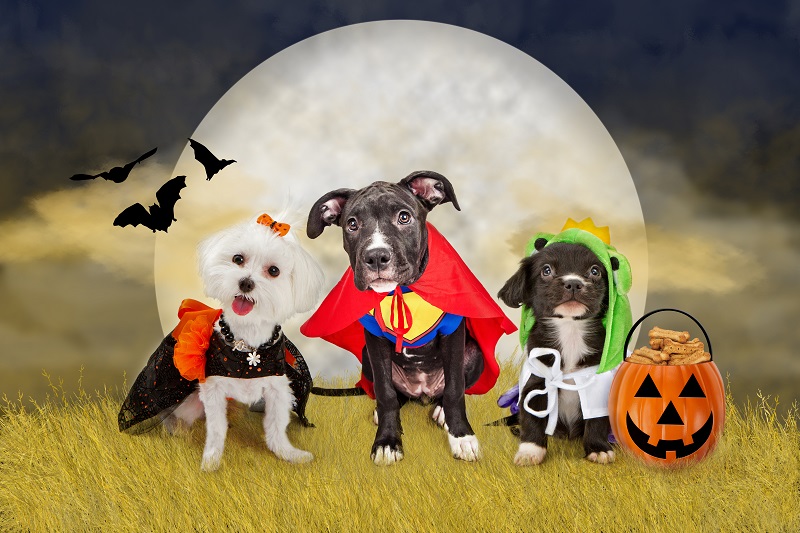
Five Tips To Keep Your Pet Safe This October
 Fall has officially arrived, and the holiday season is just around the corner. As we enter October, many people will begin to decorate for Halloween and plan out festivities for that night. Though Halloween can be a lot of fun, it can be very stressful for our non-human friends. Keep your pets safe and avoid a stressful October 31st by following these simple Halloween pet-friendly tips:
Fall has officially arrived, and the holiday season is just around the corner. As we enter October, many people will begin to decorate for Halloween and plan out festivities for that night. Though Halloween can be a lot of fun, it can be very stressful for our non-human friends. Keep your pets safe and avoid a stressful October 31st by following these simple Halloween pet-friendly tips:
- Be mindful of decorations and props
-
-
- Keep wires and battery packs out of reach
- They can be tempting chew toys for curious pets and result in possible life-threatening burns or other complications if consumed
- Candles should be placed out of reach at the risk of being burnt and causing a fire
- Pumpkins can be safe in small doses if freshly cooked
- However, uncooked and potentially moldy pieces of pumpkin can result in gastrointestinal problems and even neurological issues in cats and dogs
- Although the liquid in glow sticks if often non-toxic; it can lead to excessive salivation, erratic behavior, and vomiting
- If consumed, carefully wash your pet’s mouth with fresh water and clear the material away as best you can
- Keep wires and battery packs out of reach
-
- Be careful with costumes
-
-
- Though costumes are cute, your pet’s comfort and safety should be a top priority
- Choose the costume wisely
- Avoid costumes with rubber bands and toxic materials
- Be sure your pet is comfortable and does not become constricted or annoyed with pieces of his costume
- Costumes should not restrict movement, hearing, sight, or ability to breathe
- Take your time
- Allow your pet to wear the costume prior to the big night and become adjusted
- If your pet seems distressed, consider letting him go without one
- Pets wearing costumes should be supervised at all times so if something goes wrong, it can be quickly remedied
-
- Put away the candy
-
-
- Do not feed your pet Halloween candy
- Chocolate
- Properties within cacao seeds that are used in chocolate are often toxic to non-humans
- When ingested a pet may experience diarrhea, heavy panting, extreme thirst, rapid heart rate, seizures, and even death
- Dark chocolate is more toxic than milk chocolate or white chocolate, but all forms of chocolate pose dangers to your pet
- Properties within cacao seeds that are used in chocolate are often toxic to non-humans
- Xylitol
- Xylitol is a sweetner often used in gum and candy, as well as baked goods and toothpaste
- It can also be found in sugar-free products
- Xylitol, when ingested, may cause rapid insulin release leading to liver failure and rapid drops in blood sugar levels
- Xylitol is a sweetner often used in gum and candy, as well as baked goods and toothpaste
- Chocolate
- Do not feed your pet Halloween candy
-
- Place your pet in a safe location
-
-
- The constant opening and closing of doors, ringing doorbells, and general noise associated with groups of approaching people can be stressful and confusing to some animals
- Even the most social pets can become fearful and agitated during a stressful night
- Reduce the potential stress by placing your pet in a safe and secure area where he will be comfortable
- Keep your pet indoors if possible
- Vicious pranksters have been known to tease, harass, steal, injure, and even kill animals on Halloween
- Protect your pet by placing him safely indoors
- Black cats are especially at risk on Halloween, oftentimes shelters do not adopt black cats out during the month as a safety precaution for the animal due to the stigma of black cats
- The constant opening and closing of doors, ringing doorbells, and general noise associated with groups of approaching people can be stressful and confusing to some animals
-
- Make sure your pets have proper IDs
-
- If your pet should escape into the night, it is important to have proper identification to increase the chance that he will be returned to you
- Collars and tags with your contact information are helpful if your pet is picked up
- Microchips with up-to-date information also offer your pet a permanent form of identification should his collar or tag be removed.
These simple precautions will help humans and their non-human counterparts have a safe and happy holiday evening. If your pet comes in contact with any unknown or toxic substances, contact ASPCA Animal Poison Control Center: (888) 426-4435. For more tips on how to make Halloween a less stressful night for your pet, contact Stanley Veterinary Clinic.
